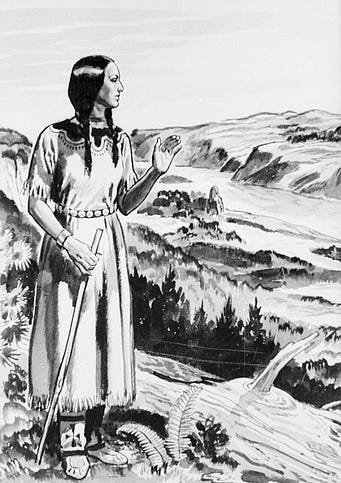|
 |
The Writer's Almanac from Saturday, April 6, 2013
"A Paris Blackbird" by Laure-Anne Bosselaar, from The Hour Between Dog and Wolf. © BOA Editions, 1997.
ORIGINAL TEXT AND AUDIO - 2013
It's the birthday of the Shoshone woman Sacajawea, born in Idaho sometime around 1789. She was kidnapped at age 10 by the Hidatsa tribe, sold into slavery, and bought by a French-Canadian trapper who made her one of his two wives. When Lewis and Clark hired the trapper to guide them to the Pacific, Sacajawea — a teenager with her two-month-old baby on her back — was part of the deal. She was the only woman to accompany the permanent party to the Pacific Ocean and back.
Officially she acted as interpreter, since she could speak half a dozen Indian languages. But she also knew which plants were edible, and she saved the explorers' records when their boat overturned. In his notes, William Clark pointed out that tribes were inclined to believe that their party was friendly when they saw Sacajawea because a war party would never travel with a woman, especially one with a baby.
When the trip was over, Sacajawea received nothing. Her trapper husband got $500.33 and 320 acres of land. She died on December 22, 1812, of a "putrid fever," according to Clark's records. She was 23. Eight months later, Clark legally adopted her two children — the boy who had been a baby on the expedition, Jean Baptiste, and an infant daughter, Lisette.
It's the birthday of critic, novelist, and short-story writer Robert Coates, born in New Haven, Connecticut (1897). So in 1921, he left the United States and went to Paris and became part of the circle of American expatriates there. Gertrude Stein helped him publish his experimental first novel, The Eater of Darkness (1926), and Coates introduced her to Hemingway. After a while he moved back to the United States and got a job with the recently launched New Yorker, writing short stories and book reviews and serving as the magazine's art critic for 30 years. It was in the pages of The New Yorker that Coates coined the term "abstract expressionism."
On this day in 1895, Oscar Wilde was arrested in room 118 of the Cadogan Hotel in London. He was arrested for "gross indecency" for sodomy.
The day before he had lost a libel case he'd brought against his lover's father, John Sholto Douglas, the 9th Marquess of Queensberry. The Marquess had called Wilde a sodomite, and Wilde wanted to humiliate him and show off his own wit by taking him to court. Wilde was the one who famously said, "The only thing worse than being talked about is not being talked about."
The whole thing backfired. Wilde lost the libel case, and Douglas gathered enough evidence to have him arrested. Still, it took two trials to convict Wilde, though it helped that the prosecution paid Wilde's former lovers to testify.
He was sentenced to two years of hard labor. He walked six hours a day in 29-minute increments, with five minute breaks, until he'd covered a distance equal to a 6,000-foot incline. He slept on a wooden plank, and for the first several months he was not allowed books, writing utensils, or paper.
When he finally got them, he wrote the poem The Ballad of Reading Gaol, an allegory of his downfall. It was published anonymously until its seventh printing, when Wilde finally told his publisher it was OK to add his name to it.
Be well, do good work, and keep in touch.®
A Prairie Home Companion’s 50th Anniversary Tour is coming to Scranton, PA on May 24, 2024! Click below for details!
If you are a paid subscriber to The Writer's Almanac with Garrison Keillor, thank you! Your financial support is used to maintain these newsletters, websites, and archive. If you’re not yet a paid subscriber and would like to become one, support can be made through our garrisonkeillor.com store, by check to Prairie Home Productions, P.O. Box 2090, Minneapolis, MN 55402, or by clicking the SUBSCRIBE button. This financial support is not tax deductible.


